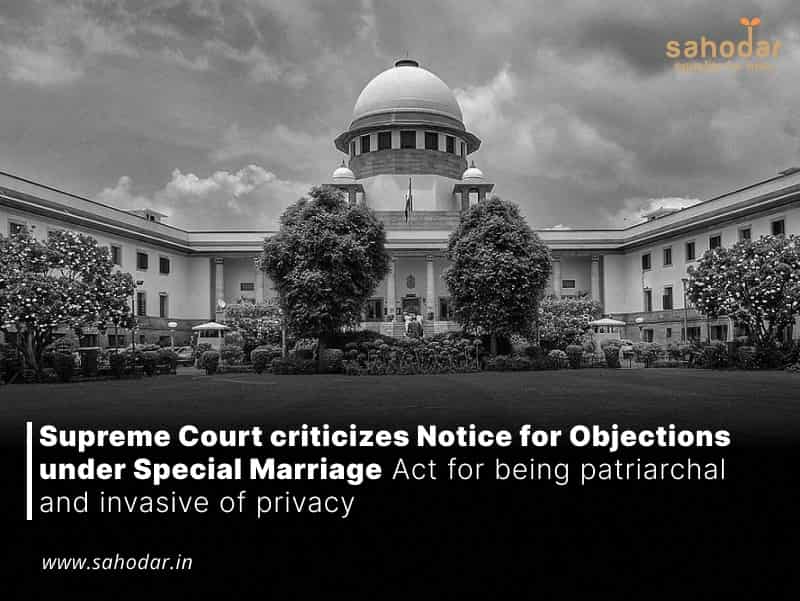Interestingly, the Supreme Court had refused to entertain a PIL challenging the provisions of the Special Marriage Act requiring publication of couples’ details 30 days before the intended marriage in public domain.
The Supreme Court stated that laws like the Special Marriage Act, which require public notice inviting objections to intended marriages, are patriarchal and invade privacy, as they were enacted at a time when women lacked agency. This observation was made by a Constitution Bench led by Chief Justice of India (CJI) DY Chandrachud while hearing petitions seeking legal recognition of same-sex marriage. The bench specifically discussed Sections 5, 6, and 7 of the Special Marriage Act, which mandate marriage officers to display public notices containing personal information of the couple, such as names, phone numbers, addresses, and more, for 30 days prior to the marriage. Senior Advocate Abhishek Manu Singhvi, representing the petitioners, argued that such provisions do not exist in personal laws of various religions, and the 30-day notice period violates the fundamental rights of the petitioners.
“Before a formal entry into marriage you are invading my privacy saying that I have to declare my intention to marry to the world. This notice and objection aspect is the violation of my personal, decisional autonomy … [it is] a relic of the Raj”, Singhvi stressed.
Justice Bhat then opined,
“This is only based on patriarchy. These laws were made when women did not have an agency.“
The CJI weighed in stating,
“This is like laying them open for invasion by the society including the Superintendent of Police, the District Magistrate etc.“
Singhvi agreed with this argument and stated that the provision should be struck down as it is disproportionate, discriminatory, and violates the right to privacy. Senior Advocate Raju Ramachandran, also representing the petitioners, later argued that if the right to marry is recognized under Article 21 (protection of life and personal liberty), such notices cannot be upheld, as they are “obnoxious” and “retrograde.” The Chief Justice of India (CJI) then expressed his opinion that if the purpose of the provision was only to prevent void marriages, it might be the least restrictive method. However, he clarified that
“There is a very real likelihood that this section will disproportionately impact if one member is from a marginalized or minority community and this it impacts one of the most vulnerable sections of our society. Regarding the protocol we have to be careful that we dont empower these officers to possess personal and private information of these individuals but we have to see that they are protected, yes.“
The hearing is currently underway.
Notably, in August 2022, the Supreme Court declined to consider a Public Interest Litigation (PIL) that challenged the requirement in the Special Marriage Act to publish details of couples intending to marry 30 days prior in a public domain.
In February of the current year, the Kerala High Court expressed the opinion that the provisions of the Act should be re-evaluated in light of contemporary times.
Last year, the Delhi High Court observed that when two consenting adults choose to live together as a married couple, no one, including their family members, has the right to interfere.
Source: https://www.barandbench.com/news/litigation/notice-inviting-objections-under-special-marriage-act-patriarchal-enables-invasion-of-privacy-by-authorities-supreme-court

